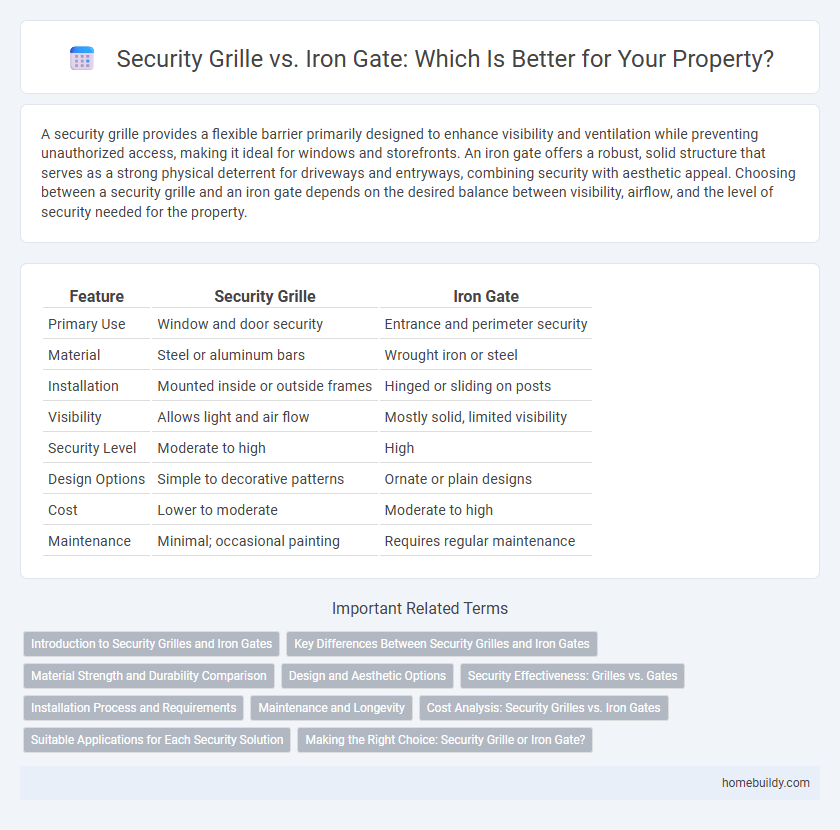A security grille provides a flexible barrier primarily designed to enhance visibility and ventilation while preventing unauthorized access, making it ideal for windows and storefronts. An iron gate offers a robust, solid structure that serves as a strong physical deterrent for driveways and entryways, combining security with aesthetic appeal. Choosing between a security grille and an iron gate depends on the desired balance between visibility, airflow, and the level of security needed for the property.
Table of Comparison
| Feature | Security Grille | Iron Gate |
|---|---|---|
| Primary Use | Window and door security | Entrance and perimeter security |
| Material | Steel or aluminum bars | Wrought iron or steel |
| Installation | Mounted inside or outside frames | Hinged or sliding on posts |
| Visibility | Allows light and air flow | Mostly solid, limited visibility |
| Security Level | Moderate to high | High |
| Design Options | Simple to decorative patterns | Ornate or plain designs |
| Cost | Lower to moderate | Moderate to high |
| Maintenance | Minimal; occasional painting | Requires regular maintenance |
Introduction to Security Grilles and Iron Gates
Security grilles provide a versatile solution for enhancing property security with their lightweight, see-through design that allows visibility and airflow while preventing unauthorized access. Iron gates offer robust protection through heavy-duty construction, often used as primary barriers for driveways and entry points, emphasizing strength and durability. Choosing between security grilles and iron gates depends on balancing security needs, aesthetic preferences, and functionality requirements.
Key Differences Between Security Grilles and Iron Gates
Security grilles are designed primarily for ventilation and visibility while providing a barrier against intruders, making them ideal for windows and storefronts. Iron gates offer a more robust level of physical security and privacy, typically used for driveway entrances or perimeter fencing with thicker bars and solid panels. The key differences lie in their structural strength, visibility, and typical installation locations, with security grilles emphasizing airflow and iron gates focusing on maximum security.
Material Strength and Durability Comparison
Security grilles are typically constructed from high-tensile steel or aluminum alloys, offering superior resistance to cutting and impact compared to the heavier cast iron or wrought iron used in iron gates. The durability of security grilles is enhanced by corrosion-resistant coatings like powder coating or galvanization, ensuring long-term protection against weathering and rust. In contrast, iron gates require regular maintenance to prevent rust and structural weakening, making security grilles a more resilient and low-maintenance option for secure property protection.
Design and Aesthetic Options
Security grilles offer a wider range of customizable design and aesthetic options compared to iron gates, including intricate patterns and transparent visibility that enhance architectural style while providing protection. Iron gates tend to focus on ornate, heavy-duty designs that serve as prominent statement pieces but may limit visibility and airflow. The flexibility of security grilles makes them ideal for modern and minimalist aesthetics without compromising security.
Security Effectiveness: Grilles vs. Gates
Security grilles provide high visibility while offering strong resistance against forced entry, making them ideal for securing windows and storefronts without compromising airflow or light. Iron gates deliver robust physical barriers with thicker materials and locking mechanisms, enhancing perimeter defense against intruders. Both solutions vary in security effectiveness depending on installation quality and material strength, but iron gates generally offer superior protection for large entry points compared to grilles.
Installation Process and Requirements
Security grilles typically feature a lightweight design and simple mounting systems, allowing for quick installation on window frames or doorways without extensive structural modifications. Iron gates require more robust foundations, often demanding concrete footings and professional welding to ensure durability and security, resulting in a lengthier and more complex installation process. Choosing between the two depends on project constraints such as installation time, structural support, and required security level.
Maintenance and Longevity
Security grilles require less maintenance than iron gates due to their simpler mechanisms and fewer moving parts, reducing the need for frequent repairs or lubrications. The materials used in security grilles, often lightweight steel or aluminum, resist rust and corrosion better than the heavy iron typically found in gates, enhancing their longevity. Iron gates, while robust, demand regular painting and rust prevention treatments to maintain their structural integrity over time.
Cost Analysis: Security Grilles vs. Iron Gates
Security grilles typically offer a more cost-effective solution compared to iron gates, with lower material and installation expenses due to their lighter design and simpler mounting requirements. Iron gates require robust hardware and reinforced structures, increasing costs associated with heavy-duty materials and professional labor. Maintenance expenses for iron gates can also be higher, as they often need regular painting and rust protection to preserve durability.
Suitable Applications for Each Security Solution
Security grilles are ideal for commercial spaces such as retail stores and shopping malls, providing visibility and ventilation while offering strong protection against theft. Iron gates are better suited for residential properties and high-security areas, delivering robust, solid barriers that enhance privacy and security. Choosing between these options depends on the need for airflow and transparency versus maximum physical security and privacy.
Making the Right Choice: Security Grille or Iron Gate?
Choosing between a security grille and an iron gate depends on factors like security level, aesthetics, and installation space; security grilles offer high visibility and ventilation while providing a strong barrier, ideal for windows and storefronts. Iron gates provide a robust, imposing presence with decorative design options, suitable for driveways and main entrances requiring both security and curb appeal. Evaluate your property's vulnerabilities, visual preferences, and functional needs to determine the best security solution.
Security grille vs Iron gate Infographic

 homebuildy.com
homebuildy.com